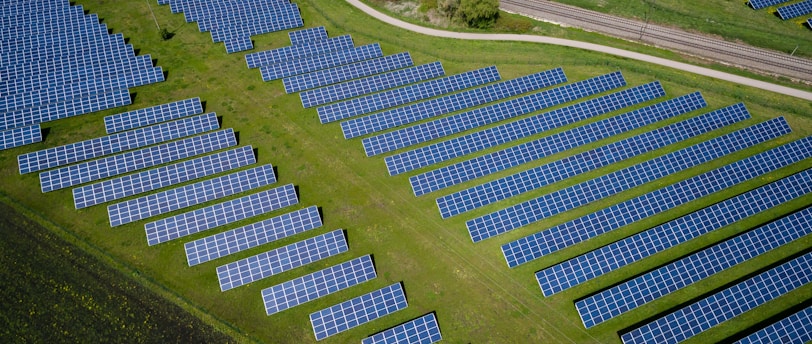The Economics of Solar Energy: Understanding Return on Investment (ROI)
Solar energy has become more than just an eco-friendly alternative; it's now a viable financial investment for homeowners, businesses, and investors. Understanding the economics of solar power goes beyond the environmental benefits—it delves into the financial aspects, such as return on investment (ROI), payback periods, incentives, and long-term savings.


1. Introduction
Solar power has emerged as a game-changer in the energy sector, offering a clean and sustainable alternative to traditional sources. However, for many, the decision to invest in solar panels goes beyond reducing carbon footprints—it's about making a sound financial choice. This article aims to shed light on the financial intricacies of solar energy, focusing on ROI and its related factors.
2. What is Return on Investment (ROI) in Solar Energy?
Return on Investment (ROI) is a key metric used to evaluate the profitability of a solar energy system. It measures the ratio of net profit generated from the system to the initial investment cost. Essentially, it tells investors how efficiently their money is being utilized in the solar project.
Importance for Investors and Homeowners
Understanding ROI is crucial for investors looking to diversify their portfolios with renewable energy assets. For homeowners, it provides a clear picture of the financial benefits they can expect from installing solar panels on their properties.
3. Factors Affecting Solar ROI
Several factors influence the ROI of a solar energy system:
Initial Investment Costs
The upfront costs of purchasing and installing solar panels vary based on the size and type of the system. This includes solar panels, inverters, mounting hardware, and installation fees.
Government Incentives and Tax Credits
Federal, state, and local governments often offer incentives to encourage solar adoption. This includes tax credits, rebates, and grants, which can significantly lower the initial investment and improve ROI.
Energy Production and Savings
The amount of energy a solar system generates directly impacts its ROI. Factors such as location, tilt angle, shading, and weather conditions play a role in determining energy production.
Maintenance and Lifespan of Solar Panels
Regular maintenance ensures optimal performance and extends the lifespan of solar panels. Understanding maintenance costs and warranties is essential for calculating long-term ROI.
4. Calculating Solar ROI
The formula for calculating ROI in solar energy is straightforward:
ROI = (Net Profit / Total Investment) x 100
Example Calculation for Clarity
Suppose a homeowner invests ₹1,50,000 in a solar energy system. Over its lifetime, the system generates ₹3,75,000 in energy savings. The ROI would be calculated as:
ROI = (₹3,75,000 - ₹1,50,000) / ₹1,50,000 x 100 = 150%
5. Payback Period in Solar Energy
The payback period is the time it takes for the cumulative savings from a solar system to equal the initial investment. A shorter payback period indicates a higher ROI and faster return on investment.
Factors Influencing Payback Periods
Factors such as system size, energy consumption, electricity rates, and incentives impact the payback period. Lowering initial costs and maximizing energy production help shorten this period.
6. Understanding Incentives and Rebates
Taking advantage of incentives and rebates can significantly improve solar ROI:
Federal Tax Credits
The Federal Investment Tax Credit (ITC) allows homeowners and businesses to deduct a percentage of their solar system costs from federal taxes.
State and Local Rebates
Many states offer additional rebates and incentives, such as cash rebates, property tax exemptions, and sales tax waivers.
Solar Renewable Energy Certificates (SRECs)
SRECs are tradable certificates that represent the renewable energy attributes of solar power. Selling SRECs can provide an additional source of revenue for solar system owners.
7. Long-Term Savings with Solar Energy
Beyond the initial ROI, solar energy offers long-term savings and financial benefits:
Reduction in Energy Bills
Solar panels offset or eliminate electricity bills, providing substantial savings over the system's lifetime.
Appreciation of Property Value
Homes with solar installations often command higher resale values, offering a return on investment when selling the property.
Environmental Benefits and Cost Savings
Reducing reliance on fossil fuels not only benefits the environment but also mitigates the impact of rising energy costs.
8. Financial Benefits vs. Environmental Impact
Investing in solar energy allows individuals and businesses to align financial gains with environmental responsibility. Balancing financial returns with green initiatives fosters sustainable growth and positive societal impact.
9. Choosing the Right Solar System for Maximum ROI
To maximize ROI, it's essential to select the right solar system based on specific needs and conditions:
Factors to Consider: Size, Efficiency, and Technology
Customizing the system size based on energy needs, opting for high-efficiency panels, and leveraging advanced technologies optimize ROI.
Professional Consultation for Optimal Investment Decisions
Seeking guidance from solar experts ensures informed decisions, considering factors such as location, shading, and budget constraints.
10. Risks and Mitigation Strategies
While solar investments offer promising returns, understanding and mitigating risks is essential:
Market Fluctuations in Solar Panel Costs
Changes in solar panel prices can impact the ROI. Monitoring market
5 Unique FAQs:
Is solar energy cost-effective in India?
Explore the cost-effectiveness of solar energy in India, considering factors such as government incentives and sunlight exposure.
How long does it take to recover the investment in a solar system in India?
Understand the average payback period for solar installations in India and factors influencing this timeline.
Are there government subsidies available for solar installations in India?
Learn about the various subsidies and incentives offered by the Indian government to promote solar energy adoption.
What are the maintenance costs associated with solar panels in India?
Get insights into the typical maintenance expenses for solar panels in India and how to keep them running efficiently.
Can I sell excess solar energy back to the grid in India?
Discover the regulations and processes involved in selling surplus solar power to the grid in India, maximizing your ROI.
Published by @TechnosysBlogs | visit for more www.technosysblogs.com
